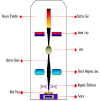REFRIGERATION
Refrigeration
is defined as “The process of removing heat from a substance under controlled
condition, reducing and maintaining the temperature of a body below the
temperature of its surroundings by aid of external work”.
Therefore
in a refrigerator, power is to be supplied to remove the heat continuously for
the refrigerator cabinet to keep it cool at a temperature less than the
atmospheric temperature.
A
medium called refrigerant continuously extracts the heat from the space within
the refrigerator which is to be finally rejected to the surroundings
Heat Engine – Any machines which converts the heat
energy into useful work is called as heat engines. (i.e) Heat is converted into
work.
Refrigerator – Refrigerator is a machine, which is used to maintain the body at low temperature than its surroundings. It is the reverse of heat engine.
Heat Pump – Heat pump is a device which is used to maintain the body at high temperature than its
surroundings. It is also reverse of heat engine. (i.e) Work is converted into heat.
UNIT OF REFRIGERATION SYSTEM
- Refrigeration is expressed in terms of “tonne of refrigeration”. It is denoted by TR.
- Tonne of refrigeration is defined as “The amount of heat that is to be removed from one tonne of water at zero (°C) in order to convert it to ice at (°C) in 24 hours”.
- One tonne of refrigeration = 210 KJ/min. = 3.5KJ/sec
- TR = 3.5 KW
COEFFICIENT OF PERFORMANCE
- COP of refrigeration is defined as “The ratio of refrigeration effect (QLoss) to the work input (Winput)”.
- It measures the effectiveness of refrigeration system.
- COP of heat pump is defined as “The ratio of heating effect (Qgain) to the work input (Winput)”
- Both COPR and COPHE are larger than 1 under same operating conditions.
- Relative COP is defined as “The ratio of the actual COP to theoretical COP”.
REFRIGERANT
- A refrigerant is a working substance in a refrigeration system.
- It is classified as a primary and secondary.
- These fluids undergoes phase change from liquid to vapour and vice versa.
- According to the system, the suitable refrigerant will be selected.
- The most common refrigerants are Freon gas, Carbon di oxide, Ammonia..









0 Comments
Write something...